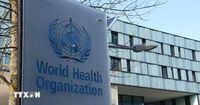In a historic move, member states of the World Health Organization (WHO) reached a groundbreaking agreement on April 16, 2025, in Geneva, Switzerland, aimed at enhancing global preparedness for future pandemics. This agreement, finalized at 7:00 AM Vietnam time, marks a significant milestone in international health cooperation following the devastating impacts of the Covid-19 pandemic, which claimed millions of lives and severely weakened economies worldwide.
WHO Director-General Tedros Adhanom Ghebreyesus hailed the agreement as a testament to collective action, stating, "The Pandemic Agreement represents collective action to protect the world and demonstrates that multilateralism still works." This statement underscores the importance of global unity in facing health threats that transcend national borders.
The agreement comes at a time when the world is grappling with emerging health threats, including H5N1 avian influenza, measles, monkeypox, and Ebola. The urgency for a coordinated response is palpable, as the aftermath of the Covid-19 pandemic continues to influence health policies and preparedness strategies globally.
Negotiations leading up to this agreement were not without challenges. Delegates in Geneva faced significant disagreements, particularly concerning Article 11, which pertains to technology exchange agreements for medical products that would be essential in responding to future pandemics. During the Covid-19 crisis, wealthier nations were accused by poorer countries of hoarding vaccines and testing kits, raising questions about equity in global health responses.
Countries with developed pharmaceutical industries expressed strong opposition to mandatory technology transfer, advocating instead for voluntary agreements. This contention highlighted the complexities of balancing intellectual property rights with the urgent need for equitable access to medical resources during health crises.
Ultimately, Article 11 was amended to stipulate that any technology transfer would require bilateral agreements, a compromise aimed at addressing the concerns of both sides while ensuring that future pandemic responses are more equitable. This adjustment reflects a growing recognition of the need for collaboration in the face of global health challenges.
In addition to the pandemic agreement, WHO is also promoting research initiatives to prepare for a potential "Disease X"—a term used to describe an unknown pathogen that could cause a future epidemic. The organization emphasizes the importance of investing in research and development to bolster global health security.
As the world anticipates the upcoming World Health Assembly in May, where the draft agreement will be presented, the focus remains on ensuring that the lessons learned from the Covid-19 pandemic are not forgotten. The collective resolve demonstrated by WHO member states signals a commitment to safeguarding public health and enhancing global cooperation.
In a related development, WHO's representative in Moscow recently confirmed that cases of a suspected strange virus in Russia were not due to a new pathogen but rather infections caused by mycoplasma pneumonia. This clarification serves as a reminder of the importance of accurate information in managing public health concerns.
The landmark agreement reached in Geneva is seen as a pivotal step towards a more coordinated global response to health emergencies. As nations prepare to face the challenges posed by emerging infectious diseases, the commitment to multilateralism and collective action will be crucial in ensuring a safer future for all.





